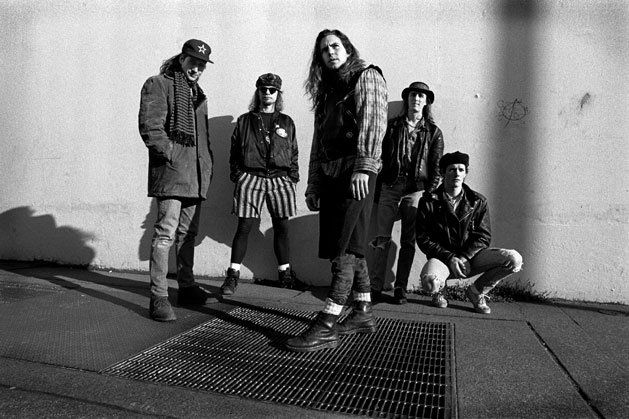
There was a four-year period or so, from about 11 to 14, when Pearl Jam was my God. It was Seattle, 1993, and I had just dyed my hair purple with Manic Panic hair dye. I'd pierced my own bellybutton—I'm still not sure my parents know this—and had two pairs of Dr. Martens (green Mary Janes and black boots) that were my uniform. "Singles" was my favorite movie (actually, it still is), and that fold-out poster that came inside the album "Ten," with the band in long johns under shorts, arms raised in a sort of rock-star high-five, was hanging above my bed. I spent hours locked in my room decoding the lyrics of "Black" and trying to decide what they really meant. Whatever it was, it was dark, tortured—and that was exactly how I felt.
My bedroom, in those days, was an oasis of incense, candles, patched 501s, hidden packs of American Spirit cigarettes and really, really bad teenage poetry. I wish I still had my middle-school diaries, so I could recite some of the embarrassing nonsense I wrote about being 13, inspired by this little band known as Pearl Jam, and how much I loved, loved Eddie Vedder. But I went home a few years back, uncovered a couple of journals, and was so obscenely mortified that I proceeded to chop the pages into scraps so tiny they could never, ever be pieced back together. I think I actually took the trash out to the alley myself, for fear one of my brothers would come across the remnants scattered across our backyard.
"Ten," the 1991 album that would go on to sell 12 million copies, and is being re-released this week, was my music for all occasions: love (adolescent crushes), breakups (if you could call them that), anger, pain and, well, general confusion about life at 13. That part in the opening track, "Once," where the electric guitar gets really intense, was the perfect slam-my-bedroom-door-and-crank-up-the-boombox retort to daily fights with my parents, because they just so didn't understand—anything.
Middle school eventually faded into high school, which brought its own problems, but at some point, Pearl Jam became secondary to more important teen crushes, and, at my high school, rap. But the band never disappeared from my life entirely. (I hosted a tribute party recently, at my apartment in Manhattan, and taped a printout of that "Ten" poster to the front door.) So when I got a voicemail from Eddie Vedder a couple of months back, returning my call about an interview, I'll admit I played it for everyone and anyone who'd appreciate it, which turned out to be not many. "But, it's Eddie f—king Vedder!" I'd exclaim. But clearly nobody had quite same connection.
When I actually did talk to Eddie on the phone, it was a little like being sucked back through time into my 13-year-old self: shy, awkward, completely star-struck. I had to close my office door so none of my colleagues could see how red I was. And I've been procrastinating transcribing the recorded interview for months now, avoiding having to hear myself clumsily questioning my former idol. (Read the interview here.)
He was perfectly charming, and normal—the last person, many reporters have noted, to embrace celebrity. But it was a standard interview. We talked, I asked him if he still wears flannel (yes), and no, he didn't profess his love for me. (Sigh.) By the time we said goodbye, I'd done enough stress-relief breathing to feel more or less like my 27-year-old self, who hasn't actually owned a Pearl Jam album since "Vitalogy."
Two weeks later, my voicemail automatically deleted the message, and I was devastated, but only for about 30 seconds. "Ten" will always be the soundtrack to my awkward teen years in . It's one of the few CDs I still have in my old bedroom, and when I'm home for the holidays, borrowing my parents' car, which has no iPod hookup, I blast it, for days on end, and it makes me miss home. And then I thank God (or Pearl Jam) that I'm no longer 13.
Uncommon Knowledge
Newsweek is committed to challenging conventional wisdom and finding connections in the search for common ground.
Newsweek is committed to challenging conventional wisdom and finding connections in the search for common ground.
About the writer
To read how Newsweek uses AI as a newsroom tool, Click here.








